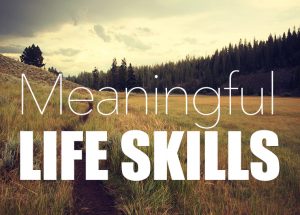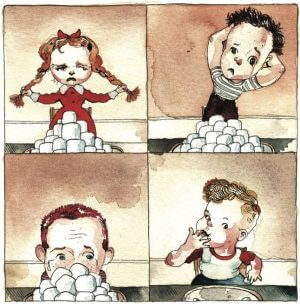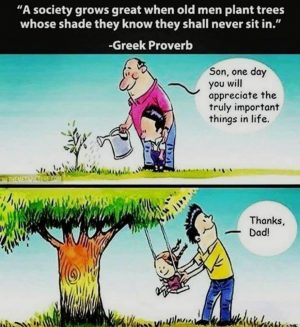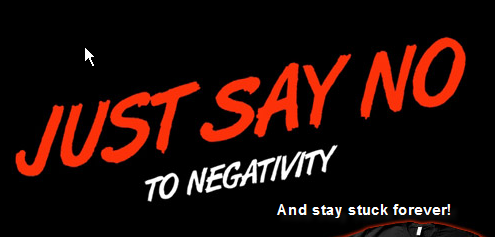 I read a very interesting article [note]
I read a very interesting article [note]
6 Insane Things Science Can Predict About You at Infancy
We like to think that, for the most part, who we are is based on life experience, hard knocks and good old-fashioned attitude. Sure, genetics plays a part, but ultimately it’s your own choices that matter — you’re not “destined” to be anything.
But science, as it usually does, has some surprising and kind of scary things to tell us. Apparently, no matter what kind of life you lead, scientists can still figure out who you’ll be at 30 based on who you were as a toddler. Studies show …
#6. If a 4-Year-Old Is Patient, He or She Will Be a Successful Adult
In the 1960s, a Stanford psychologist basically tortured 653 4- to 6-year-old kids by putting candy in front of them and telling them not to eat it. In the process, he may have unlocked the entire secret to a successful life.
The experiment went like this: The children were placed in front of a plate of treats like marshmallows and Oreos and told that they had a choice — they could either choose one treat right away, or get two treats later. All they had to do to double their treats was sit alone with the candy for 15 minutes while the researcher left the room. It was testing their ability to delay gratification.
Naturally, most of the kids at least attempted to wait, but when left alone, they began sweating and seizing like heroin addicts. Most of them cracked and went on a sugar-devouring rampage. Only about 30 percent were able to hang in there for the whole 15 minutes. And those kids wound up being more successful in life.
They found this out with a follow-up study on those same kids, and learned that the impatient children were more likely to be stressed, found it harder to maintain friendships and had lower SAT scores. The SAT scores of the kids who delayed gratification for the full 15 minutes were, on average, 210 points higher, and their parents described them as “significantly more competent.” Though at this stage, it could still theoretically be chalked up to the brain-destroying power of marshmallow overconsumption.
Then, in their 30s, the patient kids were living Leave It to Beaver-like lives of happiness and success, and the impatient kids were more likely to be fat, unhappy drug addicts. So the researchers decided to scan their subjects’ brains to see what was going on up there. Apparently, the patient subjects had a lot of prefrontal cortex activity, meaning they had greater control over social behavior and planning. The scans of the impatient kids showed more activity in the ventral striatum, the portion of the brain commonly linked with addiction.
So, if you want to predict the futures of the 4- to 6-year-old children in your life, tell them to not eat a marshmallow for 15 minutes. If they don’t eat it, continue pumping cash into their college funds. If they do, just go ahead and buy that speedboat you’ve always wanted.
#5. Babies Fed on Demand Are More Likely to Be Smart
So, now that you’re familiar with the above test, you might think that this means good parents will teach their kids to wait for their food, damn it! If they’re not born with the ability to delay gratification, then you’ll delay it for them! That’ll teach the little bastards!
Nope. While conventional wisdom says that giving kids what they want, whenever they want, is the best way to create terrible humans, research says otherwise — at least when we’re talking about infants. Babies who are fed on their own terms (i.e., “whenever they start crying”) have IQs up to five points higher at age 8 than babies who are fed according to a set schedule. They also do better on their SATs — the effect lasts right through their teens.
And this was a huge study, too — 10,419 children all together. The Institute for Social and Economic Research found that “schedule-fed babies performed around 17 percent of a standard deviation below demand-fed babies in standardized tests at all ages, and four points lower in IQ tests at age 8 years.”
And yes, before you ask, this proved still to be true after the study had corrected for socially disadvantaged kids and mothers who couldn’t afford to feed their kids until they started trying to eat the bars of their cribs. In fact, poor kids scored the same advantage as rich kids who were just as demanding.
Author and psychologist Penelope Leach says it has to do with the development of the baby brain, which is in the early stages of learning how to communicate with other humans. At that age, the “Crying for food equals I get food” lesson and bonding with mom are more important than the “Life is a cruel bitch that laughs at my desires” lesson that will inevitably be taught later.
#4. A Baby Who Snores Is More Likely to Be a Problem Child
Aw, your baby’s snoring! So adorable! Now keep that in mind so you can pinpoint the origins of the insatiable thirst for chaos he’ll later develop.
Yes, a baby who snores is 20 to 100 percent more likely to become a hyperactive tyrant. Researchers conducted a sleep habit study that followed 11,000 children from birth to age 7. The parents enrolled in the study filled out questionnaires about their child’s sleep habits and breathing difficulties at six different points in the seven-year span. A second component to the study involved screening the children for emotional and behavioral problems at ages 4 and 7. The researchers then slammed the two halves of the study together until science fell out.
They discovered that babies who snored displayed more behavior problems at ages 4 and 7, including aggressive, combative conduct and depression. By 7, a snoring baby was 1.5 times more likely to be a hyperactive, defiant monster child.
Dr. Karen Bonuck, the study’s lead author, hypothesizes that snoring causes the baby to deliver more carbon dioxide to his or her brain than oxygen. Since the child is still forming neural connections, this could cross some of the wires in the emotional regulation and social conduct centers of the brain. Or maybe what you’re misinterpreting as “snoring” is just the sound of the devils who have possessed your child growling in the night. It could go either way.
#3. Smaller Babies Do Worse on Exams
A study conducted in England found that the smaller the baby at birth, the poorer he or she performs on exams later in life.
The researchers picked out 334 kids from schools that had a pretty homogenous socioeconomic enrollment set (so they could prevent winding up with a bunch of kids who were both small and stupid for some extraneous reason, like, say, they were malnourished due to their parents’ crippling meth addiction).
Half of the kids selected were of lower-than-normal birth weight, and the others were normal or larger. At 8 years old, the kids were all given IQ tests. The researchers then examined all of their GCSE (a standardized test) scores when the kids had turned 20. The normal birth weight group not only scored higher on the IQ tests, but also scored an average of a half grade better on their GCSE tests than their less wind resistant classmates. They also completed more of the exam (the GCSE lets you choose which portions you take).
The leader of the research team, Professor Peter Pharoah of the University of Liverpool, stresses that this doesn’t mean that your gigantic freak mammoth baby is going to win a Nobel Prize. But nevertheless, science doesn’t quite know how it works, though it does seem to contradict the cliche of the short, scrawny nerd outsmarting his ogrish jock classmates.
What we’re trying to say is that for accuracy’s sake, Bruce Banner should be bigger than the Hulk.
#2. Moody Toddlers Grow Up to Be Gamblers
Back in the ’70s, some researchers in Dunedin, New Zealand, decided to examine a bunch of 3-year-olds to see whether they could predict future temperaments in kids who are still only old enough to drool on themselves and regard mundane objects with confused fascination. Observing the toddlers during independent 90-minute sessions, the researchers classified the kids as best they could as well-adjusted, reserved, confident, inhibited or “undercontrolled” (because you can’t call toddlers “assholes”).
Roughly 10 percent of the children were in that last category, which involved “lack of self-control, rapidly shifting emotions, impulsive and willful behavior and relatively high levels of negative feelings.”
When they returned to study those kids at ages 21 and 32, the researchers discovered an unexpected side effect of their subjects’ infant dickishness — they didn’t all wind up in jail, as might be expected, but scientists did find that when the “undercontrolled” kids grew up, they were twice as likely to have gambling problems as any other temperament classification.
Lead researcher Wendy Slutske cautions that just because your toddler is a mood-shifting jerk, that doesn’t mean he or she is destined to be a compulsive gambler, but she suspects that some are born vulnerable to addiction. This would explain why some people can hit up a penny slot, win $100 and never gamble ever again, and others play until they’re buried in the desert.
#1. Fearless Babies Are More Likely to Become Criminals
If you’ve ever screamed at a baby and the baby just stared back with hardcore steely resolve, just go ahead and teach him or her how to turn pacifiers into shanks, because, according to Adrian Raine, a University of Pennsylvania psychologist, a fearless baby is more likely to become a criminal as an adult.
Raine got his hands on a mental illness study from the 1970s that tested the fear responses of about 1,800 3-year-olds. The toddlers were exposed to two sets of sounds — one was a neutral tone that was followed by nothing, and the other was a neutral tone followed by a shit-your-pants-terrifying wail. The toddlers quickly figured out when to expect the scary noise, and most of them sweated in response — a normal fear reaction. Then again, there were some kids who showed no signs of fear at all.
In 2009, Raine checked in to see what the original test subjects had been doing with their lives, and found something fascinating. Along with everyone being a little fatter and uglier than they were when they were 3, Raine found that 137 of the test subjects had criminal records — and not one of them had been among the group who had sweated during the fear study when they were 3.
The discovery was examined for any result-skewing factors such as race, gender and income, but more than anything else, the outstanding variable was that all of the convicted subjects had been fearless toddlers. This leaves us with an unsettling implication — the possibility that some people are actually born criminals.
Before you use this research to establish a Minority Report-style pre-emptive justice system, Raine notes that many other kids who also didn’t show fear as babies went on to lead perfectly law-abiding lives. We would like to note that this only proves that they were never caught committing any crimes. Or maybe they grew up to be scientists who tormented 3-year-olds by blasting scary noises at them.
Read more: https://www.cracked.com/article_19889_6-insane-things-science-can-predict-about-you-at-infancy.html[/note] today. It is about being able to predict from how you were as a baby and toddler your chances for success, your chances for being smart, your chances for aberrant, deviant behavior, like crime or addictions.
And although most of you, if you read it, will be resigned to how you turned out, or alternatively argue till you are hoarse with the predictions, there is a more constructive way to read the article: get guidance.
Of course, if you are already having trouble in life, you are habitually relating to everything as a good reason to get depressed, turn to the bottle, get angry, or eat more m&m’s, but if you are not quite there, there is the guidance I recommend that you get:
All of those signs you demonstrated as a toddler are correctable by the Bach Flower Energies.
If you have a propensity for being impatient, wanting immediate gratification, not being able to hang in there and do what you need to do even if it is tedious, or unsuccessful at the moment, the Bach Flower Energy Impatience will increase your capacity for more patience, so you can actually get something done, learn something, hang in there.
Continue reading →








